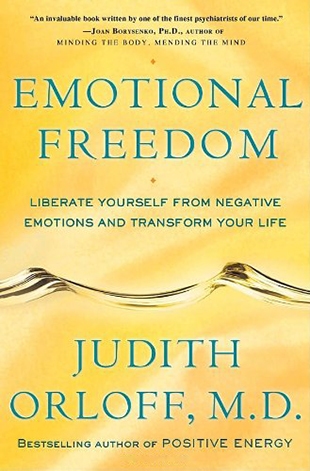Judith Orloff is a psychiatrist in private practice and an assistant clinical professor of psychiatry at UCLA. She is author of the bestsellers Positive Energy and Dr. Judith Orloff's Guide to Intuitive Healing. "Our society is in the midst of an emotional meltdown," she writes. Here's some evidence to support that statement: "Prozac was prescribed for over thirty million people. Domestic violence occurs in one out of six households. Fifty percent of drivers who're cut off respond with horn honking, yelling, obscene gestures, or even road rage. Half of our marriages end in divorce."
Orloff offers insights and practical strategies for staying positive in these difficult times. The World Health Organization has issued a warning that the global financial crisis is likely to lead to an increase in mental health problems as people struggle with poverty, unemployment, bigger work loads, job insecurity, debt, and rising prices of food, clothes, and fuel. This kind of stress challenges us to find new ways to cope. Orloff begins with four practical secrets that will empower our emotional lives and enlarge our repertoire of coping skills:
1. Reprogram the Biology of Your Emotions
2. Uncover the Spiritual Meaning of Your Emotions
3. Learn the Energetic Power of Your Emotions
4. Map the Psychology of Your Emotions
The author moves on to a section on sleep and dreams as evocative facilitators of emotional freedom. She then presents four emotional types and an overview of identifying and combating emotional vampires (people who suck us dry) and other difficult people.
By far, the most impressive section of the book is Orloff's treatment of how we can transform seven most troublesome emotions — fear, frustration, loneliness, anxiety, depression, jealousy, and anger. She notes:
"The path to emotional freedom is the hero's journey. Why? Because every choice you make to triumph over negativity, large and small, is about transforming energy. The potent nature of such ongoing transformation makes you stronger, brighter, and more resilient, which in turn acts to illuminate the world."
In the First Transformation, Orloff assesses facing fear and building courage. This chapter has special relevance to our times as it shows how to move beyond numbing and paralyzing states to bravery under fire. She concludes this chapter with a meditation on "Awakening Courage":
"In a relaxed, quiet state, focus on a time when you were courageous. Perhaps you spoke up for yourself or took the road less traveled despite what others said. Or you fought injustice or helped someone in need. Maybe you just got yourself out of bed in the morning when you felt down. All acts of courage matter. Try not to judge one as better than another. For a few minutes, bask in the feeling of courage, letting it infuse you."
In other chapters, we appreciated Orloff's attempt to give patience "a twenty-first century makeover" as an antidote to frustration and disappointment; her assertion that we need to deal with loneliness since by 2010 over 30 million Americans will live alone, nearly double the figure from 1980; her presentation of the everyday dimensions of facing anxiety and worry and creating calm in its place; her discussion of how jealousy and envy can be transformed by self-esteem, "a living, breathing positive force" that expands from within; her encouragement for opening the hidden door of compassion that exists beyond anger; and her advocacy for living in service to the heart.
